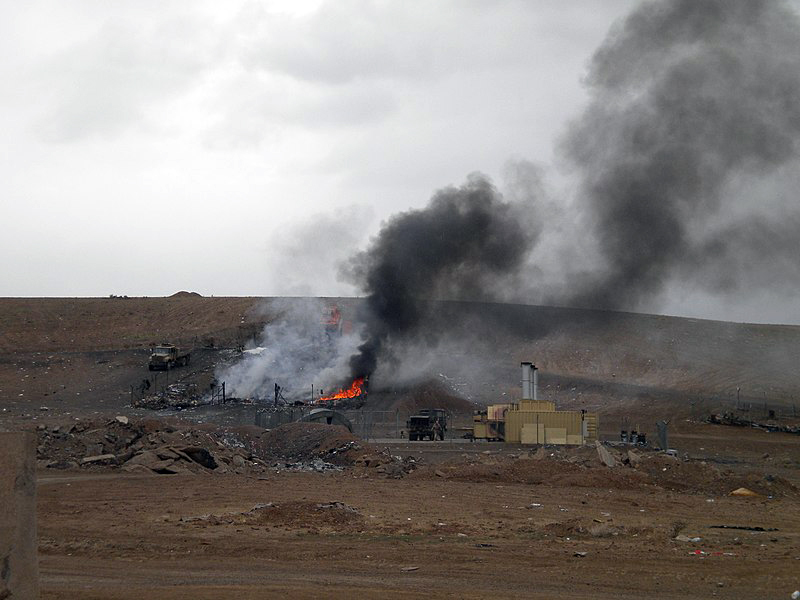The issue of ensuring access to health care and benefits for veterans who have suffered toxic exposure during service is longstanding and underrecognized. A major toxin with which many veterans and their families are all too familiar is Agent Orange, which was frequently used during the Vietnam War and which has led to horrific health problems and deaths for American veterans. As the article below recognizes, one of the most current toxic exposure issues is related to the use of burn pits in Iraq, Afghanistan and other overseas duty posts.
Many varying pieces of legislation have been introduced in Congress relative to these uses of burn pits and the subsequent toxic exposures in veterans. As was the case after Vietnam, the issue Congress is again facing related to use of burn pits is how best to comprehensively ease access to health care and benefits for veterans in cases of toxic exposure. The issue is especially important with regard to toxins, because it is often difficult for a veteran to prove that the disease or disability from which he or she currently suffers is related to his or her exposure while on duty many years ago to a toxin such as chemicals in an Iraqi burn pit.
To resolve this problem, Congress has sometimes identified particular toxins such as Agent Orange as a presumptive cause of an illness or disability. For example, a veteran who served in Vietnam during dates when Agent Orange was documented as being used may legally presume that his devastating skin condition in 2020, whose known cause is Agent Orange exposure, was in fact caused by Agent Orange exposure during service. This legal presumption is very powerful because it allows a veteran to establish eligibility to service connected disability benefits after service without having to specifically show a link between his service and his current skin disability. The link between his Vietnam service and the disability is presumed because he was in Vietnam during a time when Agent Orange was known to have been used, and he suffers from a disability recognized in VA regulations as being related to Agent Orange exposure.
However, a major problem arises when advocates try to get toxins recognized as part of the VA presumptive service connection list. As was the case with Agent Orange, and currently in the case of burn pit related exposures in Iraq, Afghanistan and elsewhere, adding known toxins to the presumptive list is not easy or straightforward. Bills are raised in Congress to recognize known toxins within VA regulations, but the process is tedious and often piecemeal. Adding known toxins to the presumptive service connection list is obviously expensive, because once a toxin is on the presumptive list, benefits must be available and paid to all veterans seeking help from the VA who qualify under the amended regulations. It is not difficult to understand why progress is slow or why lawmakers and VA are hesitant on this issue. However, it is also clear that the process is too cumbersome. Veterans are all too frequently falling through the cracks at alarming rates relative to benefit and health care access related to clearly known toxic exposures.
In other words, the question remains the same as it was following Vietnam. Could known toxins used during military service be regulated sooner for the purposes of anticipated health issues, so that VA is more prepared to help veterans if and when they do get sick? For example, it has long been known that chemicals released from burn pits are hazardous to health. If such chemicals are released in a burn pit, why not put them on a VA list entitled “known to cause cancer or other illness” when used, rather than waiting until veterans get sick? Doing so could streamline the process for veterans needing benefits and health care when they get sick after exposure to such a “known-risk” toxin.
A more proactive method could also be cheaper in the long run. It could help prevent time-consuming and expensive lobbying and wrangling in Congress, and it is also arguable that keeping a better list of known use of toxins might help prevent some health issues in the first place. For example, if active duty military were instructed to wear protective masks when in the area of known airborne toxic chemicals, such as from burn pits, some health problems might be prevented in the first place.
In short, could a more proactive and comprehensive approach to regulating such toxic exposures with benefit all involved? Comparing the current issue of burn pit exposures to the similar issues and delayed regulation veterans faced due to Agent Orange exposures fifty years ago, it seems that health problems could be prevented and tax dollars saved, and that Congress could gain back needed time, with a better system in place to regulate known exposures and the resulting health issues that face our nation’s veterans.
https://www.militarytimes.com/veterans/2021/04/28/sweeping-health-and-benefits-changes-could-come-soon-for-vets-suffering-toxic-exposure-ills/





